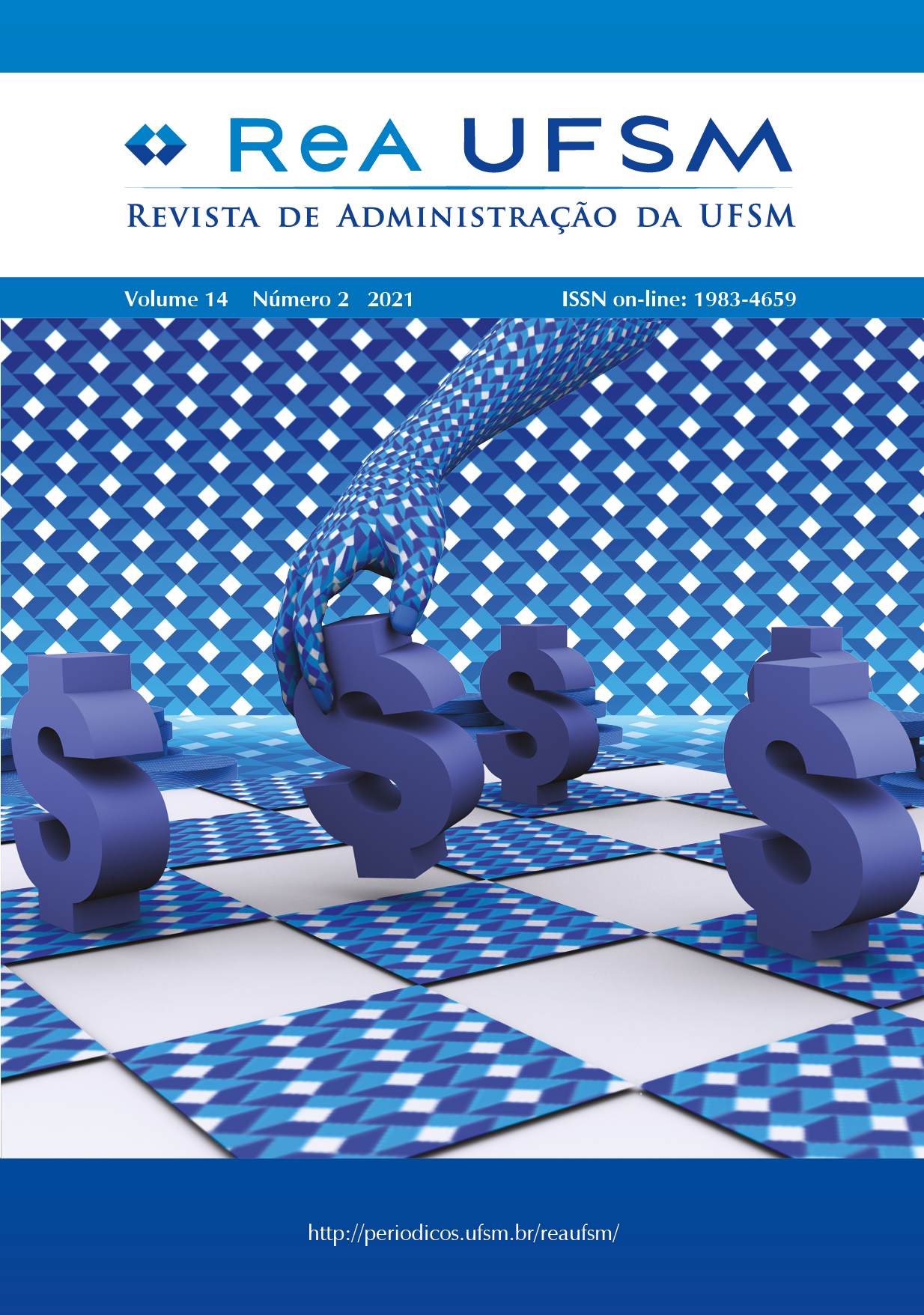Representative democracy in Brazil: an analysis of the performance of congressional representatives in light of the development indices of their states and regions
DOI:
https://doi.org/10.5902/1983465936167Abstract
Purpose – This study seeks to verify whether the performance of Brazilian Congressional Representatives is related to MHDI and GDP per capita indices and the regions they represent.
Methodology – Regarding the performance of the parliamentarians, the data used were those made available by the Transparência Brasil portal and analyzed using the multivariate exploratory non-hierarchical cluster analysis technique K-means. Federative Units were divided into clusters according to the similarities they presented with respect to the variables that made up the analysis.
Findings – After the analyses, we were able to determine that there is no relation of equivalence between the performance of representatives in Congress and the observed research development indices (MHDI and GDP per capita) with states of different regions and quite distinct conditions of development making up the same group of analysis.
Originality/value – The researched data, or even the identification of transparency actions demonstrates the wide variety of analysis possibilities that are available in terms of discussions of the performance of political agents and their respective returns for the population. We would suggest that future studies can use other data or other reports displayed in the transparency portals of various spheres of government. Other research possibilities can be developed based on qualitative analyses of the effective representativity of the projects proposed by these representatives of the people.
Downloads
References
ADVFN - Advanced Financial Network. (2017). Indicadores Econômicos: PIB. Retrived from http://br.advfn.com/indicadores/pib.
Atlas Brasil. (2013). O IDHM. Retrived from http://www.atlasbrasil.org.br/2013/pt/o_atlas/idhm/.
Atlas Brasil. (2013). Radar IDHM. Retrived from http://www.atlasbrasil.org.br/2013/pt/radar-idhm.
Baptista, A. (2010). Democracia e representação democrática. Análise Social, 45(196), 491-514. Retrived from http://www.jstor.org/stable/41012814.
Barrueto, F., & N., Patricio. (2013). Tipologías de democracia representativa en América Latina. Política y gobierno, 20(2), 265-307. Retrived from http://www.scielo.org.mx/scielo.php?script=sci_arttext&pid=S1665-20372013000200002&lng=es&tlng=es.
Bobbio, N. (2000). Teoria geral da política: a filosofia política e as lições dos clássicos (M. Bovero. Org. D. B. Versiani. Trad.). Rio de Janeiro: Campus.
Bobbio, N., Matteucci, N., & Pasquino, G. (1998). Dicionário de política. (V.1. 12a ed, Carmen C, Varriale, et al. Trad., J. Ferreira. Coord. trad., J. F.erreira e L. G. P. Cacais. Rev. Geral).Brasília: Editora Universidade de Brasília.
Brasil. (2017). Câmara dos Deputados. Retrived from http://www2.camara.leg.br/deputados/pesquisa.
Brasil. (1988). Constituição da República Federativa do Brasil. Retrived from http://www.planalto.gov.br/ccivil_03/constituicao/constituicao.htm.
Brasil. (1993). Lei Complementar n. 78. Retrived from http://www.planalto.gov.br/ccivil_03/leis/LCP/Lcp78.htm.
Cheibub, J. A, & Przeworski, A. (1997). Democracia, Eleições e Responsabilidade Política. Revista Brasileira de Ciências Sociais, 12(35) https://doi.org/10.1590/S0102-69091997000300004.
Corval, P. R. dos S. (2015) Democracia representativa: revisitando John Stuart Mill. Revista de Informação Legislativa. 52(206), 245-270. Retrived from https://www12.senado.leg.br/ril/edicoes/52/206/ril_v52_n206_p245.
Fávero, L. P. L., Befiore, P. P., Silva, F. L. da, & Chan, B. L. (2009). Análise de dados: modelagem multivariada para tomada de decisões. Rio de Janeiro: Campus Elsevier.
Figueiredo, D. B., Filho, Silva, J. A. da, Junior, & Rocha, E. do, C. da. (2012). Classificando regimes políticos utilizando análise de conglomerados. Opinião Pública, 18(1), 109-128. Retrived from https://doi.org/10.1590/S0104-62762012000100006.
Gomes, O. (2012). Macroeconomia: Noções básicas. ISCAL - Materiais Pedagógicos, Retrived from http://hdl.handle.net/10400.21/1186.
Guidini, M. B., Nascimento, A. M., Bone, R. B., & Alves, T. W. (2008). Aplicação do K-means cluster para a classificação de estilos gerenciais. Contextus – Revista Contemporânea de Economia e Gestão, 6(2), 25-34. Retrived from de https://doi.org/10.19094/contextus.v6i2.32097.
Hair, J. F., Junior, Anderson, R. E., Tatham, R. L., & Black, W. C. (2005). Análise multivariada de dados. (5a ed, A. S. Sant’Anna & A. Chaves Neto. Trad.). Porto Alegre: Bookman.
Inglehart, R. (2003). How Solid is Mass Support for Democracy – And How Can We Measure It. Political Science & Politics, 36(1), 51-57. Retrived from https://doi.org/10.1017/S1049096503001689.
Lordêlo, J. A. C.; & Pontes, M. (2009). Poder, representação, participação, conhecimento e decisão: a CPA da UFBA. In. J. A. C. Lordêlo & V. DAZZANI. Avaliação educacional: desatando nós. Salvador: EDUFBA.
Locke, J. (1973). Coleção Os Pensadores. São Paulo: Abril Cultual.
Manly, B, J. F. (2008). Métodos estatísticos multivariados: uma introdução. Porto Alegre: Bookman.
Mill, J. S. (2006). Considerações sobre o governo representativo. São Paulo: Escala.
Moisés, J. A. (2010). Os significados da democracia segundo os brasileiros. Opinião Pública, 16(2), 269-309. Retrived from https://doi.org/10.1590/S0104-62762010000200001.
Moori, R. G., Marcondes, R. C., & Ávila, R. T. (2002). A análise de agrupamentos como instrumento de apoio à melhoria da qualidade dos serviços aos clientes. Revista de Administração Contemporânea, 6(1), 63-84. Retrived from https://doi.org/10.1590/S1415-65552002000100005.
Nunes, A., & Barros, E. (2010). Caracterização territorial do desemprego registado em Portugal: aplicação da análise de clusters. Economia Global e Gestão. XV(3), 9-26. Retrived from http://hdl.handle.net/10198/4184.
Seidel, E., Moreira, F., Júnior, Ansuj, A., & Coradini Noal, M. (2008). Comparação Entre o Método Ward e o Método k-médias no Agrupamento de Produtores de Leite. Ciência e Natura, 30(1), 07-15. Retrived from https://doi.org/10.5902/2179460X9737.
Transparência Brasil. (2017). Projeto Excelências. Retrived from http://www.excelencias.org.br/.
TSE - Tribunal Superior Eleitoral (2017). Quociente Eleitoral: candidato a deputado mais votado nem sempre é eleito. Retrived from http://www.tse.jus.br/imprensa/noticias-tse/2014/Fevereiro/quociente-eleitoral-candi dato-a-deputado-mais-votado-nem-sempre-e-eleito.
Urbinati, N. (2006). Representative Democracy: Principles and Genealogy, Chicago: Chicago University Press.
Villas Bôas, O., Filho. (2010). Democracia: estado idílico da política? Revista Brasileira de Ciências Sociais, 25(74), 183-186. Retrived from https://doi.org/10.1590/S0102-69092010000300013.
Weber, M. (1993). Conferência sobre o socialismo. In: Fridman, L. C. (org.). Émile Durkheim e Max Weber: socialismo. (pp.87-128). Rio de Janeiro: Relume Dumará.
YoshimiTanaka, O., Drumond, M., Junior, Cristo, E. B, Spedo, S. M., & Pinto, N. R. da S. (2015). Uso da análise de clusters como ferramenta de apoio à gestão no SUS. Saúde e Sociedade, 24(1), 34-45. Retrived from https://doi.org/10.1590/S0104-12902015000100003.
Published
How to Cite
Issue
Section
License
Copyright (c) 2021 Brazilian Journal of Management

This work is licensed under a Creative Commons Attribution 4.0 International License.
Until 2023, copyright was transferred by the authors to ReA/UFSM. As of 2024, the authors of articles published by the journal retain the copyright to their work. ReA/UFSM operates under a Creative Commons Attribution 4.0 International License (CC BY 4.0), which permits unrestricted reuse and distribution of articles, provided the original work is properly cited.






